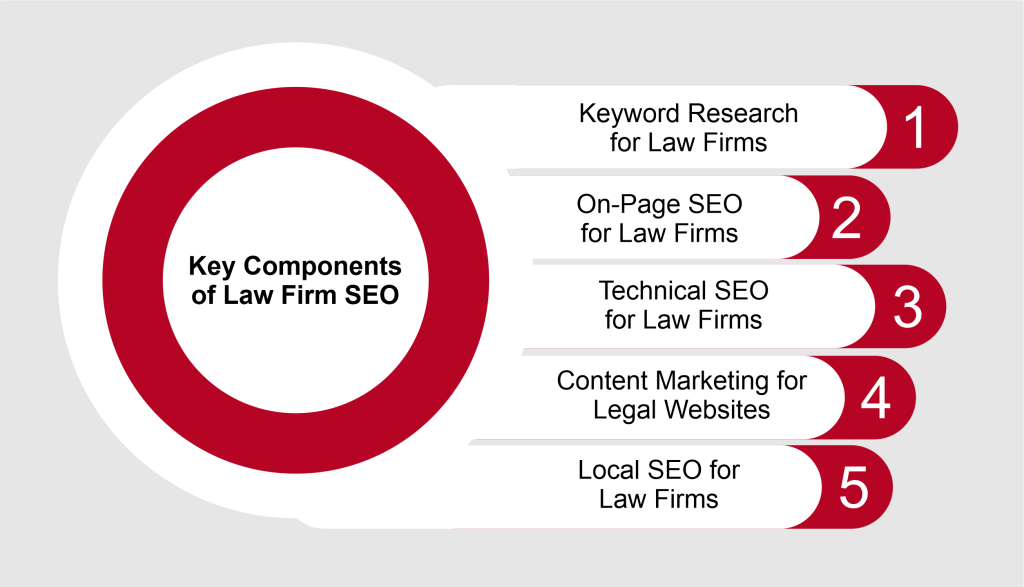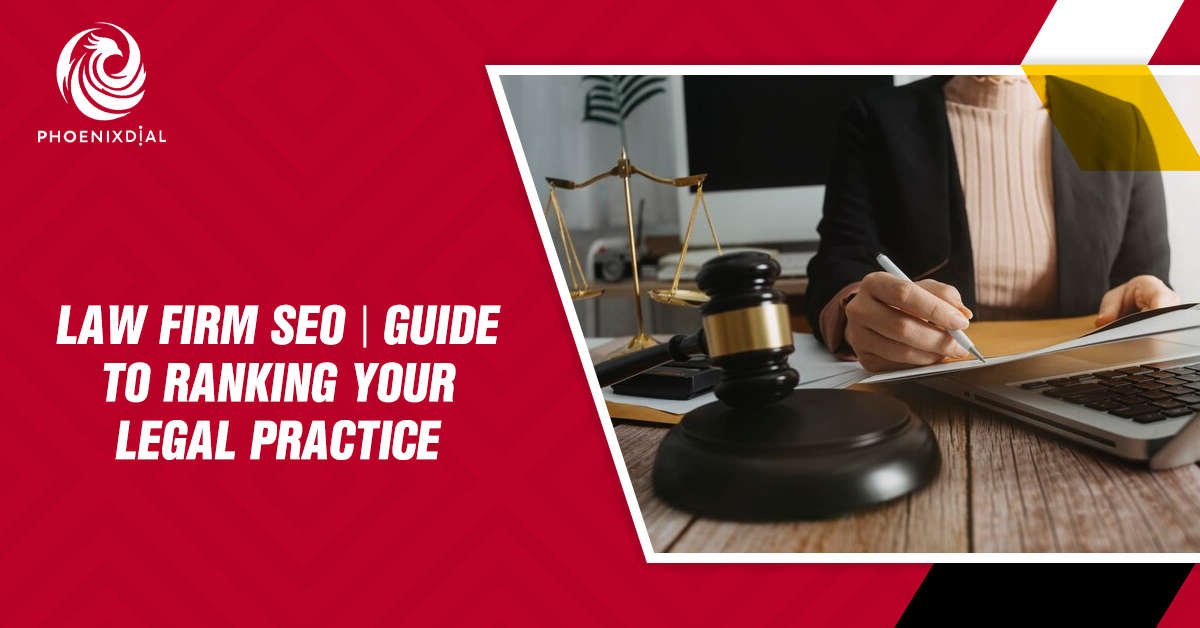SEO has become one of the most powerful growth channels for attorneys. With thousands of people searching for legal help every day, law firms that rank on Google consistently attract more potential clients. This guide explains everything you need to know about law firm SEO, how it works, why it matters, and how to implement it effectively.
Below, you’ll learn the key strategies top firms use to dominate search results using SEO for law firms, local SEO, technical optimization, content strategy, and more.
What Is Law Firm SEO?
Law firm SEO is the process of optimizing your website so your legal practice appears at the top of Google when people search for legal services. It includes improving website content, fixing technical issues, building authority, and optimizing local listings.
SEO helps your firm attract qualified leads, reduce dependency on paid ads, and build long-term visibility. Because people searching for lawyers often need immediate assistance, ranking higher greatly increases conversions.
Why Law Firm SEO Matters
Google is now the first place most clients turn to when seeking an attorney. If your firm isn’t visible, you lose potential cases to competitors.
SEO helps your firm:
- Increase organic traffic
- Build trust by appearing higher in search results
- Attract clients actively searching for your legal services
- Improve online reputation and credibility
- Stand out in a competitive legal market
Even a small improvement in rankings can significantly increase case inquiries.
Benefits of Hiring a Law Firm SEO Agency
Working with a law firm SEO agency ensures your marketing follows best practices tailored to attorneys. Legal SEO is highly specialized due to strict advertising regulations.
An experienced agency:
- Understands how legal clients search online
- Builds compliant landing pages
- Implements ethical SEO strategies
- Tracks performance and conversions
- Optimizes technical, local, and content SEO
This saves time and brings faster, more accurate results.

Key Components of Law Firm SEO
Keyword Research for Law Firms
Keyword research identifies the terms potential clients use when searching for your services. This includes primary terms like “law firm SEO” and service-based keywords like “personal injury lawyer near me.”
Effective keyword research helps you:
- Target high-intent search terms
- Understand user needs
- Plan service pages and blog content
- Optimize for both national and local searches
Using tools like Google Keyword Planner, Ahrefs, or SEMrush ensures your content matches real search demand.
On-Page SEO for Law Firms
On-page SEO involves optimizing your website’s content and structure. Each page should clearly explain your services and answer client questions.
Key practices include:
- Using keywords naturally in titles and headers
- Creating service-specific landing pages
- Adding internal links for better navigation
- Optimizing images, URLs, and metadata
- Including strong calls-to-action on every page
These improvements make your site more search-friendly and user-friendly.
Technical SEO for Law Firms
Technical SEO focuses on site performance and backend optimization. Slow or broken websites negatively impact rankings and user experience.
Important technical tasks:
- Improving website speed
- Ensuring mobile responsiveness
- Fixing broken links
- Adding structured data for legal services
- Securing your site with HTTPS
- Creating a clean site architecture
These changes help search engines crawl and understand your website more efficiently.
Content Marketing for Legal Websites
Content helps you attract visitors, build trust, and prove your expertise. Law firms that regularly publish quality content typically rank higher.
Effective legal content includes:
- Detailed service pages
- Law guides and FAQs
- Blog posts answering common legal questions
- Case studies and client stories
- Resource pages and legal updates
Content should be well-researched, easy to understand, and aligned with user intent.
Local SEO for Law Firms
Local SEO ensures your firm ranks in Google Maps and local search results. This is essential for firms targeting nearby clients.
Key tasks include:
- Optimizing your Google Business Profile
- Building local citations
- Getting positive reviews
- Adding local keywords to your pages
- Using location-based service landing pages
Strong local SEO can dramatically improve calls and consultation requests.
Local SEO for Law Firms
Google Business Profile Optimization
Your Google Business Profile (GBP) is often the first impression clients see. A complete profile boosts trust and visibility.
Ensure you:
- Add accurate contact details
- Include images of your office
- Update service categories
- Add business hours and FAQs
- Encourage real client reviews
A fully optimized profile can help you appear in the top map results.
Local Citations & Directory Listings
Local citations build credibility by listing your firm’s name, address, and phone number consistently across the web.
Useful directories include:
- Avvo
- Justia
- FindLaw
- Yelp
- Google Maps
Consistency across these platforms helps Google verify your firm’s legitimacy.
Location-Based Landing Pages
If your firm serves multiple areas, create dedicated pages for each location. These pages help you rank locally and attract area-specific clients.
Each location page should include:
- City-specific keywords
- Local testimonials
- Map embeds
- Local practice focus
This strategy improves both rankings and conversions.
Building Authority with Off-Page SEO
Backlink Building for Attorneys
Backlinks signal trust and authority. Quality links help your firm rank higher and appear more reputable.
Strategies include:
- Guest posting on legal websites
- Participating in expert roundups
- Getting mentioned in local news
- Publishing legal research or guides
Focus on earning links from trusted, relevant sites.
Online Reputation Management
Reputation plays a huge role in legal decisions. Clients want firms with strong reviews and trustworthy information.
Build credibility by:
- Responding to reviews
- Collecting testimonials
- Monitoring mentions online
- Maintaining accurate profiles
A positive online presence increases conversions significantly.
Measuring SEO Performance for Law Firms
Tracking Rankings and Traffic
Use tools like Google Analytics and Search Console to track progress. Monitor your rankings for key terms such as “law firm SEO,” “law firm local SEO,” and service-specific keywords.
Check metrics like:
- Organic traffic
- Impressions
- Click-through rates
- Page performance
Consistent monitoring ensures your strategy stays effective.
Conversions and Leads
SEO success is measured by leads—not just traffic.
Track:
- Form submissions
- Phone calls
- Consultation requests
- Live chat interactions
This helps you understand which pages and keywords generate the best results.
Conclusion
Law firm SEO is one of the most effective ways to attract consistent, high-quality clients. By improving your website, optimizing for search engines, and creating valuable content, your firm can dominate search results and build long-term visibility.
If you’re ready for higher rankings, more qualified leads, and a strong online presence, our expert law firm SEO services are here to help you dominate your local market and reach more clients than ever before.
Visit Phoenix Dial today — your trusted partner for professional, affordable, and results-driven SEO and website design services. Let’s build your success together.
FAQ’s
Does SEO work for law firms?
Yes. SEO helps law firms attract high-intent clients, improve visibility, and outperform competitors in search results.
What are the 4 types of SEO?
The four main types are on-page SEO, off-page SEO, technical SEO, and local SEO.
Why is technical SEO important for law firms?
It ensures your site loads fast, works smoothly, and is easy for Google to crawl—directly affecting your rankings.
What is the biggest problem facing law firms?
Competition is high, and many firms struggle to generate consistent qualified leads. SEO solves this by bringing targeted traffic.

